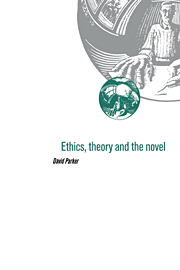Book contents
- Frontmatter
- Contents
- Acknowledgements
- Part I THE ETHICAL UNCONSCIOUS
- Chapter 1 Evaluative discourse: the return of the repressed
- Chapter 2 A new turn toward the ethical
- Chapter 3 The judgmental unconscious
- Chapter 4 The libidinal unconscious
- Chapter 5 Dynamic interrelatedness: or, the novel walking away with the nail
- Part II SOCIAL BEINGS AND INNOCENTS
- Part III TOWARDS A NEW EVALUATIVE DISCOURSE
- Notes
- Bibliography
- Index
Chapter 4 - The libidinal unconscious
Published online by Cambridge University Press: 05 November 2011
- Frontmatter
- Contents
- Acknowledgements
- Part I THE ETHICAL UNCONSCIOUS
- Chapter 1 Evaluative discourse: the return of the repressed
- Chapter 2 A new turn toward the ethical
- Chapter 3 The judgmental unconscious
- Chapter 4 The libidinal unconscious
- Chapter 5 Dynamic interrelatedness: or, the novel walking away with the nail
- Part II SOCIAL BEINGS AND INNOCENTS
- Part III TOWARDS A NEW EVALUATIVE DISCOURSE
- Notes
- Bibliography
- Index
Summary
If judgmentalism is a mode of consciousness that suppresses awareness of commonality, then there is another form of ethical unconsciousness that so stresses commonality as to suppress difference. Where the first is intent on seeing the world entirely in terms of sheep and goats, the other so universalises moral discourse as to lose sight of the dictum of Blake's Hell that ‘One Law for the lion & Ox is Oppression.’ The writer who made us most distinctly aware of this oppression was Nietzsche, who portrays Christianity as the conspiracy of the oxen to subdue the lions. For him, the attempt of Christianity and Kant to yoke us all to ‘One Law’ (as if our commonness were more fundamental than our differences) is the work of ox-like resentment. The ‘Nietzschean’ side of Blake's metaphor is that if the lion submits to the ‘One Law’ he will be violating his own nature, which is not to bear the yoke. Nietzsche's injunction to the lion is to live as a lion needs to live, and not to be troubled that this differs from the lives of the oxen.
One reason for the current appeal of Aristotle's way of organising ethics around the question ‘How to live well?’ is that this question is broad enough to include much more than the ‘One Law’ of Kant and of traditional Christian morality. Significantly, it can include within ethics the Romantic-expressivist self-responsibility in Nietzsche's implied injunction to the lion to live as a lion needs to live.
- Type
- Chapter
- Information
- Ethics, Theory and the Novel , pp. 53 - 56Publisher: Cambridge University PressPrint publication year: 1994



